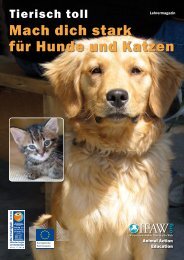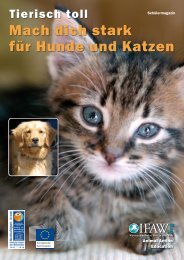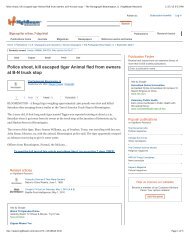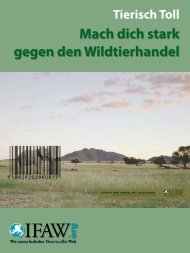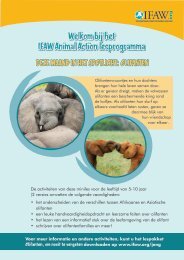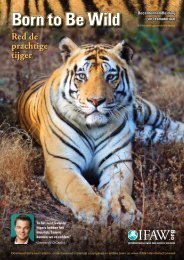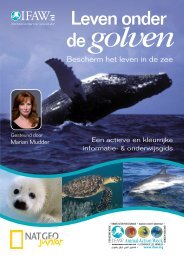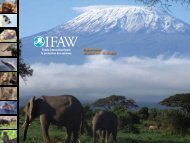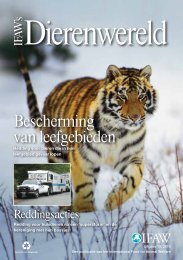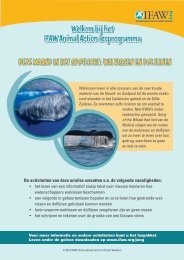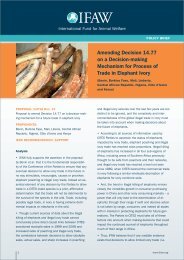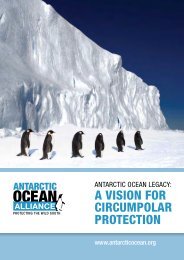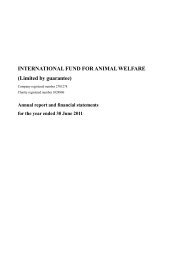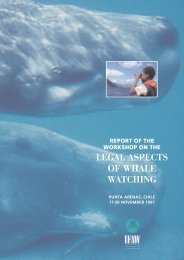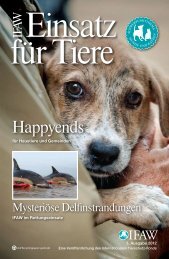Whale Watching Worldwide
Whale Watching Worldwide
Whale Watching Worldwide
You also want an ePaper? Increase the reach of your titles
YUMPU automatically turns print PDFs into web optimized ePapers that Google loves.
watching trips started (Papastavrou, 1994). IFAW also provided ideas for research that could be conducted from<br />
Icelandic whale watching boats. Then, in March 1999, IFAW funded, and participated in, a meeting of whale<br />
watching operators in Iceland. This was an opportunity for the operators to get together and discuss their<br />
common interests including operating guidelines and research. Ice<strong>Whale</strong>, the Association of Icelandic whale<br />
watch operators, grew out of this meeting. Since then IFAW has funded the Husavik <strong>Whale</strong> Centre and the new<br />
Song of the <strong>Whale</strong> visited Iceland to conduct non‐invasive whale research and public outreach activities in 2004<br />
and 2006. In early 2008, IFAW held another whale watching workshop in Iceland, which brought together<br />
participants from several other countries for a genuinely international meeting.<br />
Japan<br />
Several of the IFAW whale watching reports have been translated into Japanese. These include the reports on<br />
the Scientific Aspects of Managing <strong>Whale</strong> <strong>Watching</strong>; the Special Aspects of <strong>Watching</strong> Sperm <strong>Whale</strong>s; the<br />
Educational Values of <strong>Whale</strong> <strong>Watching</strong> and Erich Hoyt’s <strong>Whale</strong> <strong>Watching</strong> 2001 report on the value of whale<br />
watching worldwide. In 1995, IFAW visited six whale watching areas (Nachi‐katsuura, Ogata, Muroto, Choshi,<br />
Muroran and Shibetsu) to review the extent of the industry, which mainly caters for Japanese nationals rather<br />
than foreign tourists. Since then IFAW has visited other whale watching locations.<br />
In November 2004 IFAW hosted an international conference on whale watching in Choshi, Japan. Participants<br />
included a dozen Japanese whale and dolphin watch operators from across the country and experts from Asia,<br />
Iceland, mainland Europe, North America and Latin America. IFAW also created a mailing list of major whale<br />
watching operators, guides and scientists to exchange information and ideas on responsible whale watching in<br />
Japan.<br />
In 2005, when the IWC was held in Ulsan, South Korea, IFAW, together with WDCS produced a small booklet on<br />
whale watching in Japan, Hong Kong, Taiwan and Korea. Also in 2005, IFAW gave a local whale watching<br />
operator, Choshi Ocean Institute, a small grant for the first steps in creating a whale watching centre in Choshi.<br />
In 2006, IFAW gave a small grant to Zamami Village <strong>Whale</strong> <strong>Watching</strong> Association to help with its humpback<br />
whale photo ID catalogue.<br />
Latin America<br />
IFAW has organised a number of whale watching workshops in coordination with South American NGOs. In<br />
2003, a Workshop on whale watching activities was held in Punta del Este, Uruguay. The main goal of the<br />
workshop was to look at future opportunities in the region but also to identify regional conservation priorities<br />
for Southern right whales and develop guidelines.<br />
In 2004, IFAW provided funding to support a <strong>Whale</strong> <strong>Watching</strong> Workshop held in Puerto Pirámides, Chubut,<br />
Argentina. The workshop discussed regulations and a voluntary code of conduct to minimise impacts on whales<br />
at Peninsula Valdes (Sironi et al., 2005). In addition, the workshop on the legal aspects of managing whale<br />
watching was held in Punta Arenas, Chile (Birnie & Moscrop, 2000). Then in 2005 IFAW supported the First<br />
International Workshop on the Management and Non‐lethal use of Cetaceans in Peninsula Valdes, Argentina<br />
which was followed by the second international workshop in 2007 which was held in La Pedrera, Uruguay. The<br />
recommendations of this workshop were presented by the Argentine Delegation at the 58 th Annual meeting of<br />
the IWC in St Kitts.<br />
In 2008, IFAW, together with WDCS, launched a report on the state of whale watching in Latin America from<br />
México to the southern tip of South America (Hoyt and Iñíguez, 2008), which followed on from earlier work<br />
15



